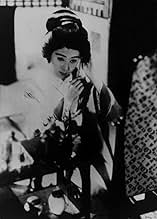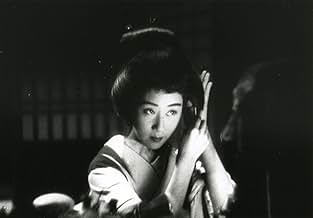IMDb RATING
7.4/10
3.2K
YOUR RATING
Two geisha sisters lead a hard life in the Gion district of Kyoto. After one of them feels obliged to support a bankrupt businessman, the other sister sets up various schemes to get rid of h... Read allTwo geisha sisters lead a hard life in the Gion district of Kyoto. After one of them feels obliged to support a bankrupt businessman, the other sister sets up various schemes to get rid of him.Two geisha sisters lead a hard life in the Gion district of Kyoto. After one of them feels obliged to support a bankrupt businessman, the other sister sets up various schemes to get rid of him.
- Director
- Writers
- Stars
- Awards
- 1 win total
Namiko Kawashima
- Oemi Furusawa
- (as Kazuko Kuno)
Fumio Ôkura
- Jurakudo, the antiques dealer
- (as Fumio Okura)
- Director
- Writers
- All cast & crew
- Production, box office & more at IMDbPro
Featured reviews
Umekichi, a geisha in the Gion district of Kyoto, feels obliged to help her lover Furusawa when he asks to stay with her after becoming bankrupt and leaving his wife. However her younger sister Omocha tells her she is wasting her time and money on a loser.
Here we have another film by Mizogucki looking at "fallen women", much like "Street of Shame" twenty years later, and to some degree "Osaka Elegy". But we also have a tale of the old and the new -- looking to the West and also sticking with tradition. This is especially interesting given the radical shift in Japanese culture after World War II.
I have not seen the remake and thus cannot compare them, but how do you top the work of Mizoguchi? You simply cannot.
Here we have another film by Mizogucki looking at "fallen women", much like "Street of Shame" twenty years later, and to some degree "Osaka Elegy". But we also have a tale of the old and the new -- looking to the West and also sticking with tradition. This is especially interesting given the radical shift in Japanese culture after World War II.
I have not seen the remake and thus cannot compare them, but how do you top the work of Mizoguchi? You simply cannot.
In the early days of film writing "Sisters" was often cited as one of the great films EVER; it is probably right that this quiet, measured film is now not viewed as such.
Still, I found it held my interest easily and was effecting. The acting is admirable, and the sadness of the women's plight are expressed without sentiment. Well worth seeing; 8 out of 10.
Still, I found it held my interest easily and was effecting. The acting is admirable, and the sadness of the women's plight are expressed without sentiment. Well worth seeing; 8 out of 10.
Master Mizogushi placed on screen two different kind of look of the gueishas's world, although they are sisters, the older is more wise and understanding about his position, the younger is more cold having in the men just a way to get an easy money, handling according her will, actually she hates them, along the movie the viewers will see two side of the street in two human being whose the life hurt too hard, nice piece of art of study of human nature!!!
Resume:
First watch: 2018 / How many: 1 / Source: DVD / Rating: 7.25
Resume:
First watch: 2018 / How many: 1 / Source: DVD / Rating: 7.25
I'm surprised by the fact that Mizoguchi was doing this kind of filmmaking and a strong criticism on geisha's lives in those years already. It must have been really innovative at the time and, for the same reason, it might probably not have been appreciated by most of the audience. I find it ironic because now it has aged considerably, that it is also hard to appreciate by today's standards. In order to fully comprehend its content, one would have to watch it with an open mind and submerge into its time. Also, the print quality might not be good, which is yet another obstacle that may keep viewers from appreciating the film as well. Fortunately, I was able to get hold of a high quality print, and it is also a great privilege to behold Mizoguchi's filmmaking techniques; I for one consider them to be of great importance in cinema history.
The story concerns two geisha sisters who live in a neighborhood known as Gion, in Kyoto. They are very different from each other; one side is influenced by a more modernized mindset, whilst the other is still rooted in traditional manners. This existing contrast will slowly unravel as the film goes on.
Technically, the film is outstanding for its time. We have that riveting tracking shot at the beginning of the film that thoroughly advances through the house of the patron of one of our two protagonists. Subsequently, you'll find yourself immersed in the many sequence shots the film is divided in.
If you're fond of Japanese cinema, you should definitely watch this forgotten gem.
My score: 8.8/10
The story concerns two geisha sisters who live in a neighborhood known as Gion, in Kyoto. They are very different from each other; one side is influenced by a more modernized mindset, whilst the other is still rooted in traditional manners. This existing contrast will slowly unravel as the film goes on.
Technically, the film is outstanding for its time. We have that riveting tracking shot at the beginning of the film that thoroughly advances through the house of the patron of one of our two protagonists. Subsequently, you'll find yourself immersed in the many sequence shots the film is divided in.
If you're fond of Japanese cinema, you should definitely watch this forgotten gem.
My score: 8.8/10
The characters in Sisters of Gion are trapped, but like many women in a Japan of that era, which was... well, for a while up until 1936 and beyond. Particularly that of the Geisha, whose lives would have to revolve around men who would want them to "do things" for them; not simply sexual, though there was that, but just to take care of them, and buy things for them, etc. So in this story, Mizoguchi has a character, Omocha (Isuzu Yamada) who looks at her lot and life and doesn't like it, and tries to tell her much more submissive sister Umekichi the same. So she spends most of this story swindling a guy with a kimono mostly at the expense of a lower-rung guy who is staying with them, Furusawa, who lost his business. Not so much cause she's a bad person (she isn't) but just as the guy and who he's with kind of deserve it.
The story moves along at a fairly good pace, especially considering how short it is at 69 minutes (though according to IMDb the version available through the Eclipse DVD series is the shortened cut, a few times it does show), and it's pretty good... not great, mind you, but good. Some, or I should say most, of the dialog is a little too on-the-nose about the points it wants to make, even near the end when Mizoguchi really gains momentum with his story and the male-female dynamics of this society. And yet by the end it is powerful and moving, in some part because of how strongly he directs the film; those shots that kind of take deep focus looking down an alleyway that is kind of narrow, closing in on the characters, or how long he stays on a shot (he was all about the long takes too), almost like there's no escape for these girls.
So, do come for the feminism on display, which could be seen as overwrought or dated but only because it's 1936 and for its time is powerful - and stay for some elegant direction, some wonderful acting (watch the scene where Omocha has the guy over who is there on official matters, kind of to scold him for how she treated his employee, but then softens up when she serves Sake), and a couple of moments of good music, however sparse. 7.5/10
The story moves along at a fairly good pace, especially considering how short it is at 69 minutes (though according to IMDb the version available through the Eclipse DVD series is the shortened cut, a few times it does show), and it's pretty good... not great, mind you, but good. Some, or I should say most, of the dialog is a little too on-the-nose about the points it wants to make, even near the end when Mizoguchi really gains momentum with his story and the male-female dynamics of this society. And yet by the end it is powerful and moving, in some part because of how strongly he directs the film; those shots that kind of take deep focus looking down an alleyway that is kind of narrow, closing in on the characters, or how long he stays on a shot (he was all about the long takes too), almost like there's no escape for these girls.
So, do come for the feminism on display, which could be seen as overwrought or dated but only because it's 1936 and for its time is powerful - and stay for some elegant direction, some wonderful acting (watch the scene where Omocha has the guy over who is there on official matters, kind of to scold him for how she treated his employee, but then softens up when she serves Sake), and a couple of moments of good music, however sparse. 7.5/10
Did you know
- TriviaDaiichi Studio went into bankruptcy following the poor commercial results of the film.
- ConnectionsReferenced in Kenji Mizoguchi: The Life of a Film Director (1975)
Details
- Release date
- Country of origin
- Language
- Also known as
- Las hermanas de Gion
- Production company
- See more company credits at IMDbPro
Box office
- Gross worldwide
- $17,807
- Runtime
- 1h 35m(95 min)
- Color
- Aspect ratio
- 1.37 : 1
Contribute to this page
Suggest an edit or add missing content






















